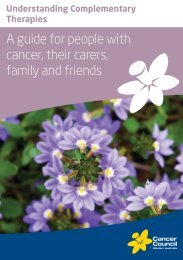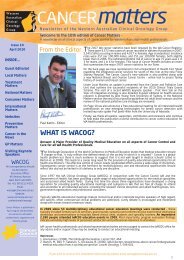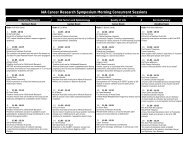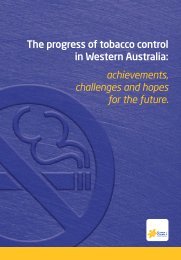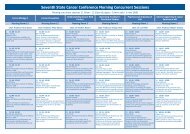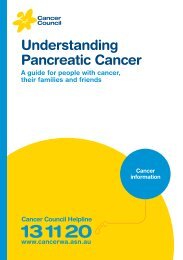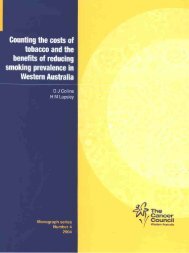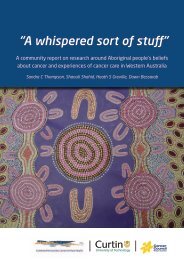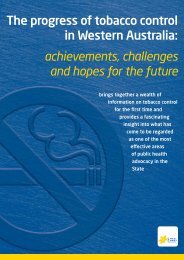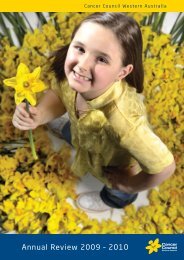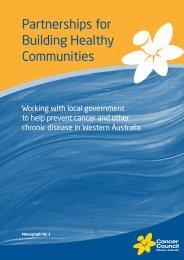Testicular cancer - Cancer Council Western Australia
Testicular cancer - Cancer Council Western Australia
Testicular cancer - Cancer Council Western Australia
You also want an ePaper? Increase the reach of your titles
YUMPU automatically turns print PDFs into web optimized ePapers that Google loves.
The testicles<br />
The testicles (or testes) are two small oval-shaped<br />
organs in the scrotum, that hangs below the penis.<br />
Often one testicle hangs a little lower than the<br />
other one. This is perfectly normal.<br />
The testicles are the primary male reproductive<br />
organ. From the age of puberty, around 14 years<br />
of age, the testicles make sperm, the male<br />
reproductive cell. They also make the hormone<br />
testosterone. This hormone is responsible for male<br />
characteristics such as a deep voice, body and<br />
facial hair growth, muscle development and sexual<br />
feelings (libido).<br />
What is testicular <strong>cancer</strong>?<br />
Like other <strong>cancer</strong>s, testicular <strong>cancer</strong> is a disease<br />
of the body's cells. Sometimes cells don't grow<br />
normally. When these abnormal cells reproduce<br />
they form a lump or tumour. A tumour can<br />
be either malignant (<strong>cancer</strong>) or benign (non<strong>cancer</strong>ous).<br />
In testicular <strong>cancer</strong> the cells in the<br />
testicle have grown abnormally. The <strong>cancer</strong><br />
usually grows in only one testicle.<br />
If the <strong>cancer</strong> is not treated it may spread to other parts<br />
of the body. Although the causes of testicular <strong>cancer</strong><br />
are not well understood, recent developments in<br />
treatment make it one of the most curable <strong>cancer</strong>s.<br />
How common is this <strong>cancer</strong>?<br />
It is not a very common form of <strong>cancer</strong>, but it is one<br />
of the most common <strong>cancer</strong>s in males aged between<br />
15 and 45 years. In <strong>Western</strong> <strong>Australia</strong> in 2010,<br />
70 cases of testicular <strong>cancer</strong> were diagnosed and<br />
there were 6 deaths from this <strong>cancer</strong>.<br />
What are the signs and symptoms<br />
of testicular <strong>cancer</strong>?<br />
The most common sign of testicular <strong>cancer</strong> is a<br />
swelling or a small hard lump in part of one testicle.<br />
Most males with testicular <strong>cancer</strong> notice a difference<br />
between the shape and texture of their testicles. One<br />
grows larger, becomes harder or changes shape<br />
compared with the other. Any difference between the<br />
two testicles should be treated as an early warning<br />
sign and should be checked by your doctor.<br />
Tumours are often painless but some men have<br />
described an ache in their lower stomach or groin, or<br />
a pain in one of their testicles. Some describe a feeling<br />
of ‘heaviness’ in the scrotum.<br />
Most lumps are not <strong>cancer</strong>ous, but a man who<br />
experiences any of the changes mentioned earlier or<br />
any discomfort in the testicular area, should contact<br />
their doctor immediately. Prompt diagnosis and<br />
treatment can cure most cases of testicular <strong>cancer</strong>.<br />
Don't wait or think that because there is no pain that<br />
there is nothing to worry about. If left untreated, the<br />
<strong>cancer</strong> can spread to other parts of the body.<br />
Treatment for testicular <strong>cancer</strong><br />
An operation to surgically remove the <strong>cancer</strong> affected<br />
testicle (an orchidectomy) is the usual treatment for<br />
testicular <strong>cancer</strong>. Chemotherapy or radiotherapy, or<br />
a combination of these, may also be used to treat<br />
testicular <strong>cancer</strong>. The type of treatment will depend on<br />
the type of <strong>cancer</strong>, and whether it has spread beyond<br />
the testicle.<br />
Some treatments do have side effects. Any effect on<br />
fertility is usually temporary, and the remaining testicle<br />
produces enough sperm to maintain fertility. In a small<br />
number of cases fertility may be a problem. Speak to<br />
your doctor about fertility before you start treatment.<br />
There is not normally any change in a man's ability to<br />
have erections or engage in sexual intercourse.<br />
Those at risk<br />
Although the cause of testicular <strong>cancer</strong> is not fully<br />
understood, it is known that a man who has had an<br />
undescended testicle (known as cryptorchidism), is<br />
at increased risk of developing testicular <strong>cancer</strong> later<br />
in life. This is still a risk whether it was treated during<br />
childhood or not. Please seek advice from a doctor.<br />
Other risk factors include:<br />
• Being a man aged between 20 and 40<br />
• Having a father or brother with testicular <strong>cancer</strong><br />
• Having a wasted (atrophied) testicle<br />
• Previous inflammation of a testicle caused by<br />
mumps<br />
• History of fertility problems<br />
• Previous testicular <strong>cancer</strong><br />
If you are at higher risk of testicular <strong>cancer</strong>, discuss<br />
this with your doctor.




